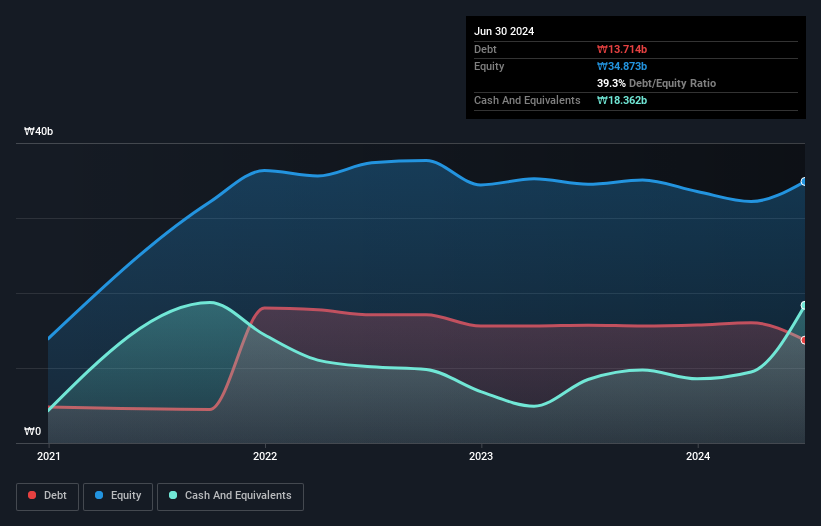Does NP (KOSDAQ:291230) Have A Healthy Balance Sheet?
Legendary fund manager Li Lu (who Charlie Munger backed) once said, 'The biggest investment risk is not the volatility of prices, but whether you will suffer a permanent loss of capital.' So it might be obvious that you need to consider debt, when you think about how risky any given stock is, because too much debt can sink a company. As with many other companies NP Inc. (KOSDAQ:291230) makes use of debt. But is this debt a concern to shareholders?
Why Does Debt Bring Risk?
Debt and other liabilities become risky for a business when it cannot easily fulfill those obligations, either with free cash flow or by raising capital at an attractive price. Ultimately, if the company can't fulfill its legal obligations to repay debt, shareholders could walk away with nothing. However, a more frequent (but still costly) occurrence is where a company must issue shares at bargain-basement prices, permanently diluting shareholders, just to shore up its balance sheet. Of course, the upside of debt is that it often represents cheap capital, especially when it replaces dilution in a company with the ability to reinvest at high rates of return. The first step when considering a company's debt levels is to consider its cash and debt together.
View our latest analysis for NP
What Is NP's Debt?
The image below, which you can click on for greater detail, shows that NP had debt of ₩13.7b at the end of June 2024, a reduction from ₩15.7b over a year. However, its balance sheet shows it holds ₩18.4b in cash, so it actually has ₩4.65b net cash.

How Healthy Is NP's Balance Sheet?
The latest balance sheet data shows that NP had liabilities of ₩6.39b due within a year, and liabilities of ₩11.2b falling due after that. On the other hand, it had cash of ₩18.4b and ₩1.37b worth of receivables due within a year. So it actually has ₩2.10b more liquid assets than total liabilities.
This short term liquidity is a sign that NP could probably pay off its debt with ease, as its balance sheet is far from stretched. Succinctly put, NP boasts net cash, so it's fair to say it does not have a heavy debt load! There's no doubt that we learn most about debt from the balance sheet. But it is NP's earnings that will influence how the balance sheet holds up in the future. So if you're keen to discover more about its earnings, it might be worth checking out this graph of its long term earnings trend.
Over 12 months, NP made a loss at the EBIT level, and saw its revenue drop to ₩29b, which is a fall of 29%. To be frank that doesn't bode well.
So How Risky Is NP?
Although NP had an earnings before interest and tax (EBIT) loss over the last twelve months, it made a statutory profit of ₩772m. So taking that on face value, and considering the cash, we don't think its very risky in the near term. We'll feel more comfortable with the stock once EBIT is positive, given the lacklustre revenue growth. There's no doubt that we learn most about debt from the balance sheet. But ultimately, every company can contain risks that exist outside of the balance sheet. For example, we've discovered 3 warning signs for NP that you should be aware of before investing here.
Of course, if you're the type of investor who prefers buying stocks without the burden of debt, then don't hesitate to discover our exclusive list of net cash growth stocks, today.
Have feedback on this article? Concerned about the content? Get in touch with us directly. Alternatively, email editorial-team (at) simplywallst.com.
This article by Simply Wall St is general in nature. We provide commentary based on historical data and analyst forecasts only using an unbiased methodology and our articles are not intended to be financial advice. It does not constitute a recommendation to buy or sell any stock, and does not take account of your objectives, or your financial situation. We aim to bring you long-term focused analysis driven by fundamental data. Note that our analysis may not factor in the latest price-sensitive company announcements or qualitative material. Simply Wall St has no position in any stocks mentioned.
 Index Options
Index Options CME Group
CME Group Nasdaq
Nasdaq Cboe
Cboe TradingView
TradingView Wall Street Journal
Wall Street Journal